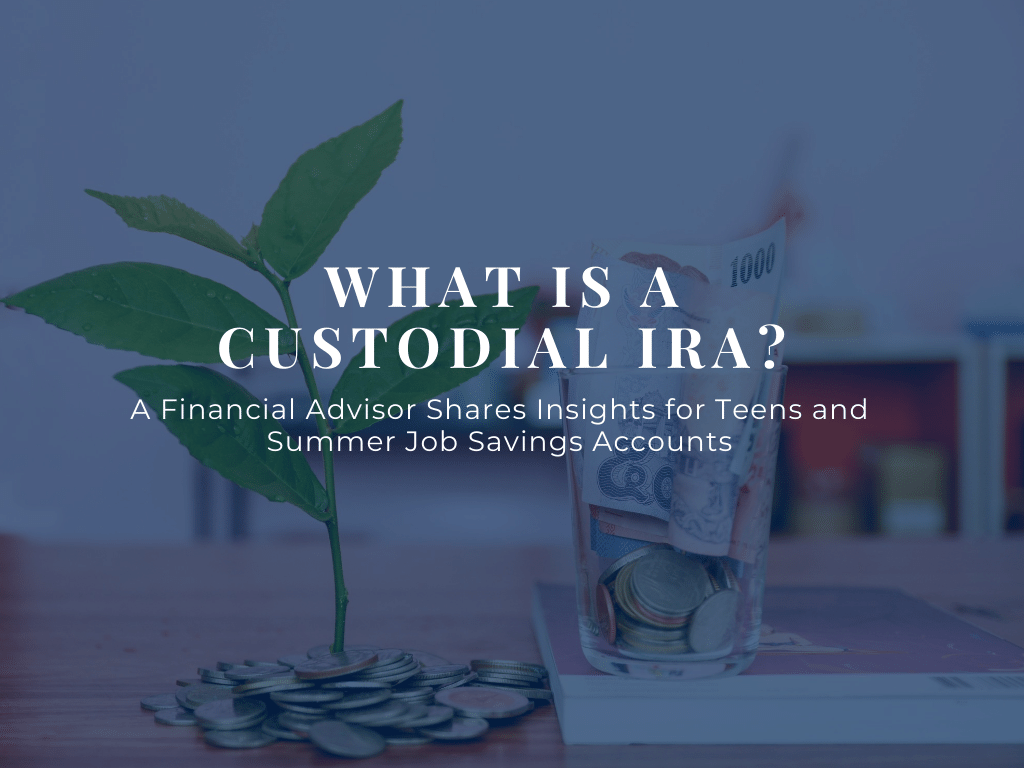
Intern Peggy M. interviews portfolio manager Razmig Pounardjian for thoughts on what teens should do with their summer savings accounts. Here is Peggy’s post.
The teenagers in your life may be starting to have some savings of their own. Maybe they are waitressing, working at the mall, babysitting, lifeguarding or through some good old fashion nepotism, they may be working at your firm.
No matter the job, your teen may be earning real money for the first time with a summer job. This is a great teaching moment for sharing values about saving and the beauty of compounding interest.
After talking with Razmig Pounardjian, portfolio manager at Carnegie Investment Counsel, I have a summary about options for savings vehicles for teens. (This is the point where you skim the article below and forward it to the teen in your life, child or grandchild, in a text message with too many emojis.)
Teen Summer Savings Summary
What is a custodial IRA?
A custodial IRA (Individual Retirement Account) is a retirement savings account that a custodian (usually a child’s guardian) holds for a minor with earned income. The “custodian” manages the account until the minor turns 18 (or 19 for Alabama and Nebraska; 21 for Indiana, Mississippi, New York and Puerto Rico).
Teens: If your parent or guardian opens a custodial IRA for you, the money in the account belongs to you, and allows you to get an early start on saving. The compound interest you learned in school applies here: the money you put away in the custodial IRA goes to work for you, earning dollars on top of what you invest in the account.
By the way, if you think it’s crazy to care about retirement at this point in your life, consider this: according to bankrate.com, if you invested $1,000 at age 18 and added $500 to that investment every month for your lifetime, you could be a millionaire by age 55. Don’t believe me? Use the bankrate.com million dollar calculator here.
“Getting started saving early makes goal achievement so much easier,” said Razmig Pounardjian, portfolio manager at Carnegie Investment Counsel. “For teens who will not have to dip into all their summer savings during their college years, it is a good idea to start setting aside money early.”
However, it is not as simple as putting your money into a custodial IRA; there are different versions of custodial IRAs with varying advantages and purposes. The two main types of custodial IRAs are Roth and traditional.
What’s the difference between a traditional and a Roth IRA?
A Roth IRA is a type of IRA where you deposit money you’ve earned after taxes have already been taken out of your income. Because the money you put into a Roth IRA has already been taxed, the earnings grow tax-free. You can withdraw the money from this account once you turn 59½ (assuming that the account has been open for five years already). Some IRAs require you to take out a certain amount of money each month once you reach a certain age. These are called Required Minimum Distributions (or RMDs). A Roth IRA has no RMDs, so you are never required to withdraw from this account. If you pass it on to your heir(s), those earnings and withdrawals are also income tax-free.
You can deposit money into a traditional custodial IRA either after it’s been taxed or before. Typically pre-tax income is put into these accounts because that gives you immediate tax benefits. Also, there are no income limits on the traditional IRAs (a drawback that Roth IRAs do have). However, you must start taking withdrawals (RMDs) from the traditional IRA at age 72.
If you are a teen, it may be hard to imagine being 72, so let’s get back to the present and talk about setting up a budget.
Why should I have a budget as a teen?
I know what you’re thinking. I’m (insert age), at home with my parents, with no rent or electricity bills to worry about. Why should I have a budget? Summer is supposed to be fun. But, the fact that you’re seeing this article might be a hint that your parents want you to learn some financial values.
“Planning out how much you make in a month and how much you spend is a great practice for the real world,” said Pounardjian. “A budget allows you to think long-term about your money. Over a summer you may make enough to open a Roth IRA, but if that chunk of income is gone before the summer is over, you missed an opportunity to set yourself up for success. A budget can help with making sure you don’t overspend.”
As an intern, I was thrilled to be able to learn about the value of saving from a professional in the field. I learned that many of the advisors welcome a chance to chat about finances with their client’s family members. Contact your advisor to schedule a call. Thank you for reading this article. We hope it provided value.
 Razmig Pounardjian serves as Portfolio Manager; managing custom portfolios for select clients at Carnegie Investment Counsel. Raz genuinely cares about his clients’ well-being, and they know that they have an advocate who is there to help guide and manage their investments through their careers and into retirement.
Razmig Pounardjian serves as Portfolio Manager; managing custom portfolios for select clients at Carnegie Investment Counsel. Raz genuinely cares about his clients’ well-being, and they know that they have an advocate who is there to help guide and manage their investments through their careers and into retirement.
Carnegie Investment Counsel is a registered investment adviser with the Securities and Exchange Commission (SEC). The opinions presented are subject to change without notice. Performance information was obtained from third party sources. Although these sources are widely used, and Carnegie deems these sources reliable, Carnegie makes no guarantee as to the accuracy of the information provided by these third parties. The information provided is for general informational purposes only and should not be considered a solicitation to effect transactions in securities or personalized investment advice. Past performance is not a guarantee of future performance.
Got Questions? Ready to Meet With a Financial Advisor?
Schedule an appointment today to learn more about how Carnegie can help with financial planning and wealth management.



